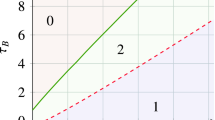Abstract
This paper investigates imitation dynamics with continuously distributed delay. In realistic technological, economic, and social environments, individuals are involved in strategic interactions simultaneously while the influences of their decision-making may not be observable instantaneously. It shows that there exists a time delay effect. Different distributions of delay are further considered to efficiently lucubrate the stability of interior equilibrium in the imitation dynamics with continuous distributions of delay in the two-strategy game contexts. Precisely, when the delay follows the uniform distributions and Gamma distributions, the authors present that interior equilibrium can be asymptotically stable. Furthermore, when the probability density of the delay is general density, the authors also determine a sufficient condition for stability derived from the expected delay. Last but not least, the interested but uncomplicated Snowdrift game is utilized to demonstrate our theoretical results.
Similar content being viewed by others
References
Aumann R J, Rationality and bounded rationality, Games Econ. Behav., 1997, 21: 2–14.
Smith J M and Price G R, The logic of animal conflict, Nature, 1973, 246: 15–18.
Smith J M, The theory of games and the evolution of animal conflicts, Theor. Biol., 1974, 47: 209–221.
Smith J M, Evolution and the Theory of Games, Cambridge University Press, Cambridge, UK, 1982.
Hines W G S, Evolutionary stable strategies: A review of basic theory. Theor. Popul. Biol., 1987, 31: 195–272.
Cressman R, The Stability Concept of Evolutionary Game Theory: A Dynamic Approach, Springer, Berlin, 1992.
Thomas B, On evolutionarily stable sets, J. Math. Biol., 1985, 22(1): 105–115.
Balkenborg D and Schlag K H, Evolutionarily stable sets, Int. J. Game Theory, 2001, 29(4): 571–595.
Weibull J, Evolutionary Game Theory, The MIT Press, Cambridge, USA, 1995.
Hofbauer J and Sigmund K, Evolutionary game dynamics, Bull. Am. Math. Soc., 2003, 40(4): 479–519.
Burnham T C and Johnson D, The biological and evolutionary logic of human cooperation, Anal Krit, 2005, 27(1): 113–135.
Rosas A, Evolutionary game theory meets social science: Is there a unifying rule for human cooperation, J. Theor. Biol., 2011, 264(2): 450–456.
Qi H, Wang Y, Liu T, et al., Vector space structure of finite evolutionary games and its application to strategy profile convergence, Journal of Systems Science and Complexity, 2016, 29(3): 602–628.
Liu H, Chen X, Guo L, et al., Generalized consensus of discrete-time multi-agent systems with directed topology and communication delay, Journal of Systems Science and Complexity, 2020, 33(6): 1903–1913.
Zhang Q, Wu X, and Liu J, Pinning synchronization of discrete-time complex net works with different time-varying delays, Journal of Systems Science and Complexity, 2019, 32(6): 1560–1571.
Tao Y and Wang Z, Effect of time delay and evolutionarily stable strategy, J. Theor. Biol., 1997, 187: 111–116.
Alboszta J and Miekisz Z, Stability of evolutionarily stable strategies in discrete replicator dynamics with time delay, J. Theor. Biol., 2004, 187: 175–179.
Ben-Khalifa N, El-Azouzi R, Hayel Y, et al., Evolutionary games in interacting communities, Dyn. Games Appl., 2017, 7: 131–156.
Pi J, Yang H, Shu Y, et al., The stability of two-community replicator dynamics with discrete multi-delays, Mathematics, 2020, 8(12): 1–17.
Ben-Khalifa N, El-Azouzi R, and Hayel Y, Discrete and continuous distributed delays in replicator dynamics, Dyn. Games Appl., 2018, 8: 713–732.
Zhong C, Yang H, Liu Z, et al., Stability of replicator dynamics with bounded continuously distributed time delay, Mathematics, 2020, 8(3): 1–12.
Oaku H, Evolution with delay, Jpn. Econ. Rev., 2002, 53: 114–133.
Tembine H, Altman E, El-Azouzi R, et al., Bio-inspired delayed evolutionary game dynamics with networking applications, Telecommun. Syst., 2011, 47: 137–152.
Hu W, Zhang G, and Tian H, The stability of imitation dynamics with discrete distributed delays, Physica A, 2019, 521: 218–224.
Wang S, Yu J, Kurokawa S, et al., Imitation dynamics with time delay, J. Theor. Biol., 2017, 420: 8–11.
Hofbauer J and Sigmund K, Evolutionary Games and Population Dynamics, Cambridge University Press, UK, 1998.
Hale J K and Lunel S M, Introduction to Functional Differential Equations, Applied Mathematical Sciences, Springer, USA, 1993.
Bernard S, Blair J, and Mackey M, Sufficient conditions for stability of linear differential equations with distributed delay, Disc. Cont. Dyn. Syst. Ser. B, 2001, 1: 233–256.
Zhang Y and Sun J, Stability of impulsive linear hybrid systems with time delay, Journal of Systems Science and Complexity, 2010, 23(4): 738–747.
Cao Z, Qin C, Yang X, et al., Dynamic matching pennies on networks, Int. J. Game Theory, 2019, 48: 887–920.
Sandholm W H, Population Games and Evolutionary Dynamics, The MIT Press, Cambridge, USA, 2010.
Cressman R, Evolutionary Dynamics and Extensive form Games, The MIT Press, Cambridge, USA, 2003.
Gopalsamy K, Stability and Oscillations in Delay Differential Equations of Population Dynamics, The Kluwer Academic Press, Netherlands, 1992.
MacDonald N, Biological Delay Systems: Linear Stability Theory, Cambridge University Press, Cambridge, UK, 1989.
Author information
Authors and Affiliations
Corresponding author
Ethics declarations
The authors declare no conflict of interest.
Additional information
This research was supported by the National Natural Science Foundation of China under Grant No. 11271098 and Guizhou Provincial Science and Technology Fund under Grant No. [2019] 1067 and the Fundamental Funds for Introduction of Talents of Guizhou University under Grant No. [2017] 59.
Rights and permissions
About this article
Cite this article
Fang, C., Yang, H., Pi, J. et al. The Stability of Imitation Dynamics with Continuously Distributed Delays. J Syst Sci Complex 36, 2067–2081 (2023). https://doi.org/10.1007/s11424-023-1276-z
Received:
Revised:
Published:
Issue Date:
DOI: https://doi.org/10.1007/s11424-023-1276-z




